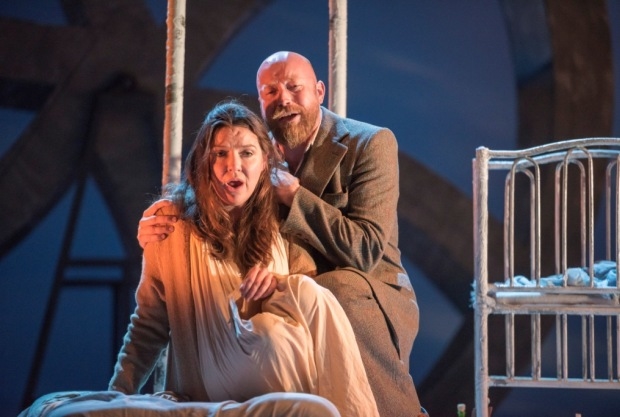Jenůfa (Longborough Festival Opera)

© Matthew Williams-Ellis
A dramatic opera that spans three generations of the same family—four, if you count a murdered baby—needs careful casting. On that score this Jenůfa from the enterprising Longborough Festival Opera is hit and miss to say the least, although it does boast two outstanding performances.
Richard Studer‘s old-fashioned production tells Janáček’s harrowing story of human jealousy and Christian zeal with more efficiency than flair. A large upstage watermill dominates the eyeline, yet it does little more than define the opera’s location while the main action takes place on a pair of raised, sloping platforms. This open space setting works well enough for the outer scenes, but the central act’s essential mood of febrile claustrophobia, set as it is during the heroine’s 21st week of confinement in a shuttered house, goes for nothing, while at one point the lack of a material window leads to an unfortunate am-dram moment.
The director’s attention to character definition is well considered and gives good scope to those artists with sufficient technical skill to see it through. Andrew Rees‘s bum-smacking Števa may be hail-fellow-and-well-met when we first meet him, but there’s already a snivelling wretch just below the surface. Fellow tenor Daniel Norman, meanwhile, impressively traces Laca's tortuous journey from cruelty to hope to redemption.
Norman it is, with his taut, ringing, masculine timbre, who delivers one of those two world-class performances. There is never a moment when this singing actor takes refuge in gesture: he inhabits his character absolutely.
'An electric charge that lets the opera win through'
The other stand-out turn comes, unsurprisingly, from Lee Bisset in the title role. Goodness knows how the nation’s busiest soprano has managed to fit this show in between her Sieglinde/Norn for Opera North‘s Ring cycle and her forthcoming Lady Macbeth for Dorset Opera, but there is no trace of a squeeze. She is on devastating form. In Bisset’s hands, Jenůfa’s mental and physical collapse on learning of her baby’s death is organic, unstudied and unbearably moving.
The expressive steel in Bisset’s voice suggests it’s high time she took on Ellen Orford in Peter Grimes, while the day she essays the Kostelnička in this same Jenůfa cannot be too far distant. For Longborough, a valiant but miscast Gaynor Keeble struggles to match her operatic stepdaughter in the part. Though not the first mezzo to tackle this soprano character, her range is wrong for a role that needs to open up with ferocious high notes at moments of intense drama, as when she berates Števa for refusing to see his baby. Nor does Keeble’s externalised acting help her recoup credibility in a role for which she seems younger than the younger generation around her.
Jonathan Lyness conducts the house orchestra in a well shaped if soft-edged reading of Janáček’s music drama, and some excellent singers grace the minor roles, notably Nazan Fikret as a feisty Karolka and Piotr Lempa as the Mayor. They all contribute to an electric charge that lets the opera itself win through, as it always seems to.
Jenůfa continues in repertory at Longborough Festival Opera until 23 July.










